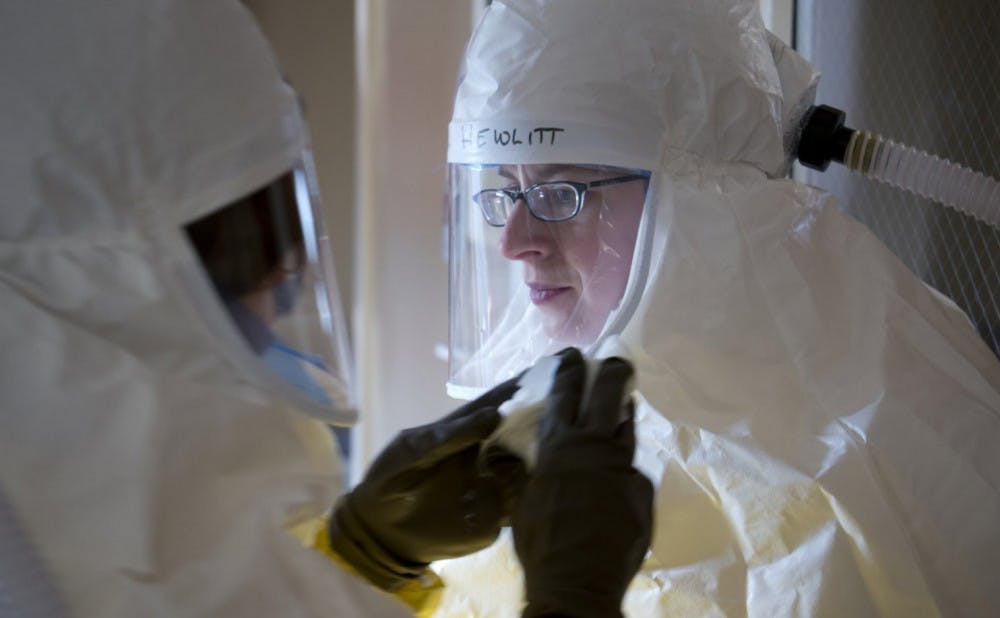Students are pioneering potential solutions to end the spread of Ebola.
The Social Entrepreneurship Accelerator at Duke is launching the Ebola Innovations Challenge. Throughout the challenge, the student community will submit possible plans to end the spread of Ebola. According to data collected by the Centers for Disease Control and Prevention, three cases of Ebola have been confirmed in the U.S., including two nurses previously in contact with the deceased patient. Amid the growing concern of the infectious disease in the US, the global Ebola crisis is one that requires eminent solutions to address a broader population.
“The vast majority of the Global Health problems today could be solved with science we already have,” said sophomore Priyanka Venkannagari, a member of the student advisory committee of SEAD. “[The challenge] is about implementation, execution and how we can use existing resources to better a community in need.”
The 2014 Ebola outbreak—one of the largest in history—has a cumulative number of 8,997 cases according to the Oct. 15 report by the World Health Organization. The Ebola virus spread through these developing countries with poor precaution measures and treatment measures, afflicting the general population as well as healthcare workers. In the middle of the crisis, SEAD seeks to engage students and faculty in working to address the global concern.
“Within the student engagement work stream of SEAD, we put on the Ebola Innovations Challenge because it is a very timely and high-profile challenge going on globally right now,” said Kimberly Bardy Langsam, program director of SEAD.
SEAD—one of the seven university development labs selected nationwide in 2012 to participate in the Higher Education Solutions Network,an initiative which receives funding from the United States Agency for International Development—focuses on facilitating and scaling the impacts of global health innovations. The Ebola Innovations Challenge also fits into the Fighting Ebola Challenge by OpenIDEO, a design and innovation platform, in partnership with the USAID grant challenge.
The Ebola Innovations Challenge is the second annual challenge initiated by SEAD open to the entire Duke student community. Last year, the challenge was to bring healthcare awareness to a broader audience in Kenya.
“[The Challenges] are not very medically-oriented at all,” Venkannagari said. “It’s more about business and policy solutions. For example, how do you deliver healthcare more efficiently in Third World countries.”
To participate in the challenge, students can sign up as individuals, a partial team or a full team. Individuals and partial teams will be put together to organize final multidisciplinary teams. The teams will then have a week of time to submit their innovative ideas and solutions. Five finalists will be selected to present at a panel of experts in the field and receive feedbacks. Langsam added that the goal is to generate excellent ideas to submit to the Fighting Ebola Challenge.
“We want to create an environment where students can engage with and learn from others from different background, such as medicine and public policy,” she said.
The challenge is not only open to undergraduate students but also to the graduate and professional community. After the presentation, a winner of the Challenge will be selected. Kyle Munn, program coordinator of communications and marketing at SEAD, noted that the judging process will be based on how innovative and practical the ideas are, and how likely the propositions could be implemented.
Co-sponsors for the Challenge include organizations across campus such as SEAD, Center for the Advancement of Social Entrepreneurship and Duke Global Health Institute. During the challenge, the sponsors will host a series of events to help participants with the overall process. The events will feature a kick-off speaker and a number of workshops dedicated to introducing the broader context for the Ebola crisis, ways to work best in interdisciplinary terms and idea generation.
“The challenge will give students the opportunity to work with multidisciplinary groups, practice problem-solving skills, learn from other students and find ways to think outside of the box,” Langsam said.
Get The Chronicle straight to your inbox
Signup for our weekly newsletter. Cancel at any time.

